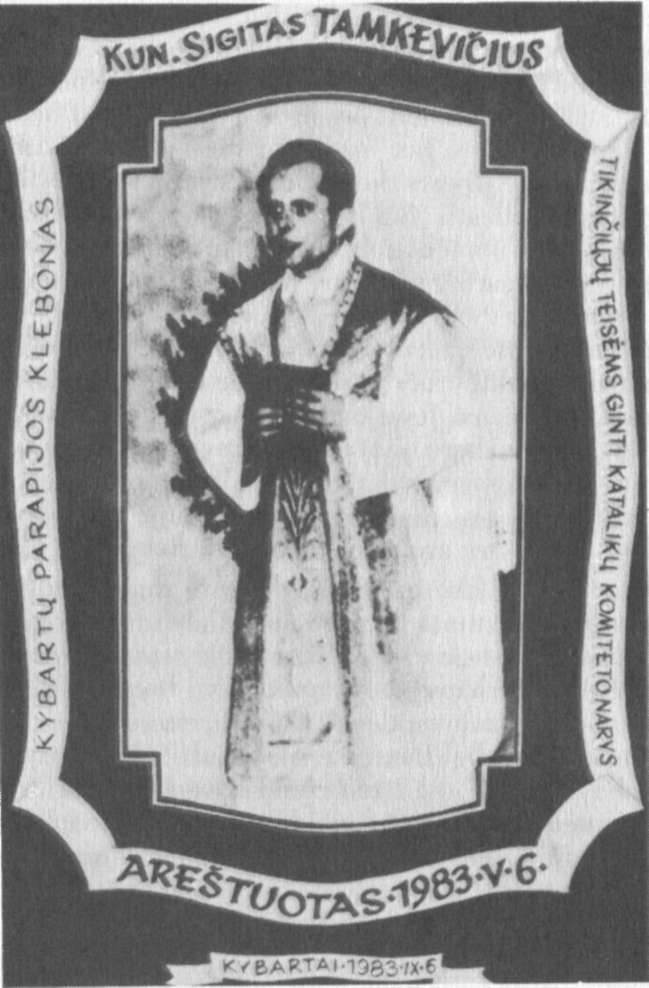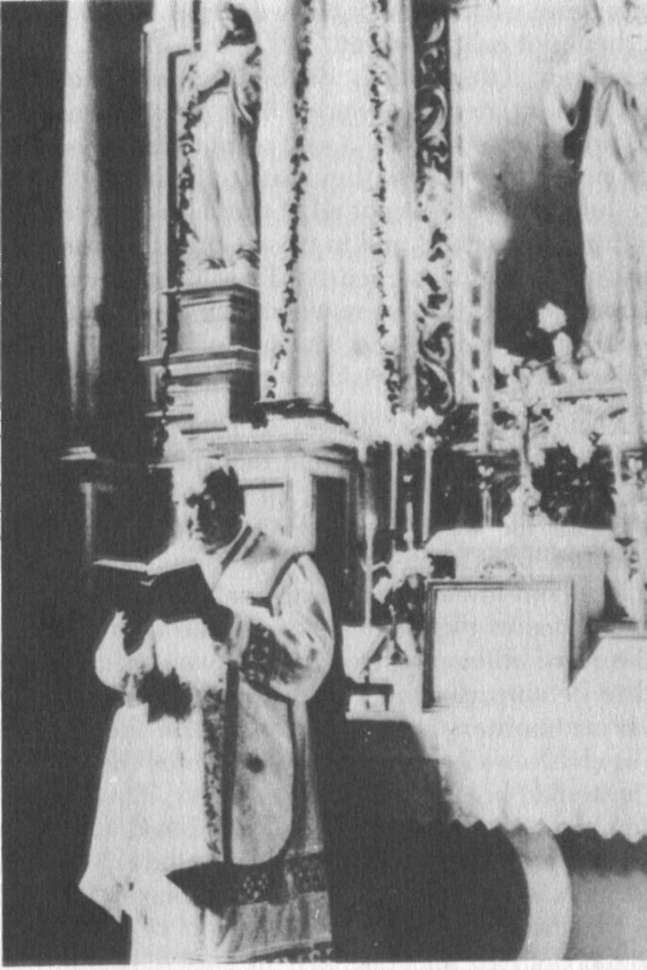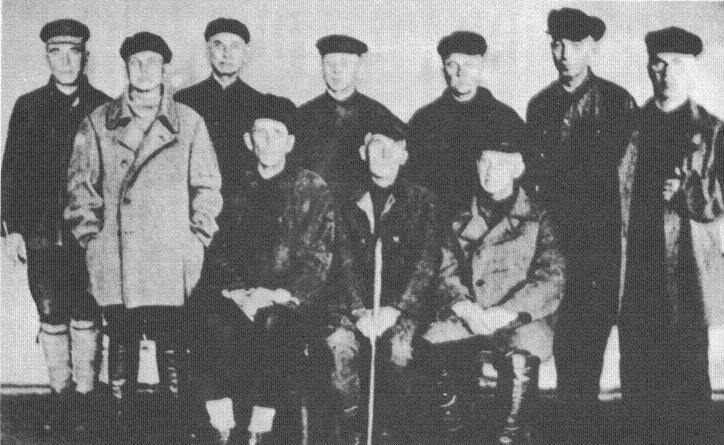(A Sermon Delivered in 1981 in the Church of Alksnėnai)
Christ, sending his apostles into the world, gave them some instructions on how they should act. Jesus told them that the world would not welcome the apostles, that quite often the children of this world would he like wolves, and that the apostles woidd have to watch out for those wolves — that they would have to he as cunning as serpents and as guileless as doves. Finishing his instructions, Jesus said, "Do not fear those who kill the body, but cannot kill the soul; rather be afraid of him who can destroy both body and soul in hell."
Today, June 22, in many locations in Lithuania and elsewhere, people gather to honor the victims, innocent victims. Some gather to pray for them, others to participate in various commemorations, organized on that occasion.
It is not important on what occasion people gather; it is important that everyone use the occasion to reflect. Today we have gathered in the first place to pray for three priests who, exactly forty years ago, June 22, were horribly tortured to death. Many of you know that story; I can only repeat it in summary.
The morning of June 22, 1945, some soldiers knocked on the door of the rectory of Lankeliškiai, escorting from the rectory the pastor and two other priests who had come to visit. The soldiers took all three priests to the Budavonės woods, and there brutally tortured them to death. One of them was Jonas Petriką, Chaplain of the Marijampolės Ryliškių Jono High School. According to those who knew him, he had actually been in charge of the high school, and had been a good if exacting chaplain.
The second of those tortured to death was Justinas Dabrila, 36, a professor at the Seminary in Vilkaviškis, Doctor of Canon Law, and Spiritual Director.
The third was the pastor of Lankeliškiai, Vaclovas Balsys, 30 years old.
Many things are told about the torture, some of them contradictory. Today, the eyewitnesses and perhaps even the perpetrators are most likely not among the living. It is probable that they were not even able to escape, since the sound of German mechanized equipment could be heard already, and their planes were overhead. . . Anyone who wanted to escape had to move quickly. Most brutally

A clandestine commemoration card marking the arrest of Father Sigitas Tamkevičius, pastor of the parish of Kybartai, arrested May 6, 1983, during the trial of Father Alfonsas Svarinskas. Both priests were charter members of the Catholic Committee for the Defense of Believers' Rights.
tortured was the pastor of Lankeliškiai, Father Vaclovas Balsys. The other two were tortured less, since the executioners ran out of time. They had to hurry, so they shot their victims and fled.
That day in Lithuania, not only these three priests were tortured to death. . . Iri the Parish of Skaruliai, four priests were shot . . . Today , we wonder why they were killed. For no reason at all. Only a madman could think that these priests, somewhere near their house, the rectory, could hurt the army in any way. Only a madman could think so, hut they were not madmen, they were executioners, and they considered the priests their enemies. And so, they killed them, torturing them to death. No beast acts like this. A beast tears his enemy into pieces immediately. A human being can be worse than an animal; before tearing someone to pieces, before killing, he takes pleasure in another's suffering.
Who were those executioners? We have come here today, not to seek out their names, nor to determine their nationality: Whether they were Lithuanians, Jews or Russians, this is not what concerns us. We have come here, not led by revenge, and not to square accounts, as is customary today. . . We have not gathered to square accounts with the executioners, to determine their color or what they looked like — we are concerned with something else.
Today, I would like to share with you some thoughts on how such executioners come to be, how such individuals come to be who killed the three priests, and who, if Only they could have, would have killed hundreds. Perhaps, they would have torn out the tongues of many. There were such incidents. How do executioners come to be? I am reminded of Nobel Laureate Aleksandr Solzhenitsyn. In one of his books he writes: "... I too could have been like that. I could have been cruel, dishonest, I could have tortured people but my situation was different, and so I did not become an executioner. . ."
Who knows what would have happened to us if all of us who have gathered here to pray, and who harbor absolutely no hatred toward those killers, but are instead sorry for them as unhappy children of God — if we have been born and received the kind of rearing which they did. . . Surely it is not they who should most be to blame, but all those who raise killers. The life of many of those who were killers in 1941 was as follows:
More than one of them was borne and thrown out by a mother who was a member of the Communist Youth League. Even our press writes about this. More or less ten years ago a book was published called Love and the Family; where we find it written that no serious man in Russia wanted to marry a girl from the Communist Youth League, but used to look for a girl who did not belong anywhere, because everybody considered Communist Youth girls prostitutes — that's what it says there. Many such girls used to contract civil marriages twenty times each. Thien obtain a divorce, give birth to children and throw them out on the street.
Such children, ii they did not die beside some fence, would grow up in youth homes; later they were called besprozorniki.They used to struggle for existence the way a wolf cub or tiger cub does: stealing and robbing people. Of course they used to be hunted and tried; the camps were full of them, but not all of them died there. Lithuanians who wound up in the camps and in prison after the war used to meet those individuals, more like beasts. They used to call themselves blatny and other names; they were worst than beasts. Killing a person, driving a nail into his forehead, cutting oil a nose or ears meant nothing to them. In fact, it gave them satisfaction.
And such besprozorniki, as they were growing up in children's homes and going to school, were told that priests are terrible. They are exploiters, bourgeois, deceivers, all sorts of deviates. Into young hearts ruined for life were poured poison and hatred toward those so-called class enemies. Later many of these men among whom one could look high and low for conscience or humanity, were called up for military service in the front ranks. So one need not wonder that they could torture others and treat people worse than animals; there is no need to be surprised by their behavior, nor are they the ones to blame. If our mothers had thrown us out on the street, if we had grown up in children's homes where sometimes there was not a bite to be had, if we had been reared by the streets, if from infancy hatred had been implanted in us, and that hatred had taken root in our hearts, who knows what we would be like today? Perhaps we too would be killers today, so we should not blame those who were animals on that June 22...
We should ask ourselves who it is who raises beasts, rears killers, and ask ourselves whether in our day there are not those who could equally without blinking torture to death another human being. Often we hear, "In Garliava, they killed a man for a ruble, another for a few rubles, coming by night they tortured him to death" — they who went to school in our day...
Today a trial has begun in Kaunas. A group of criminals will be tried who rampaged for a long time, torturing priests and others which caused them no problem because the only thing they had in mind was the ruble, pleasure. Such a person is drawn like an animal only by his instincts, he is capable of anything, he has no conscience, feels no responsibility. His only concern is not to get caught, and if

Father Leonas Šapoka, one of the three priests murdered in Lithuania during a state-inspired campaign of terror against the clergy in 1980-81. The pastor of Luoke was brutally tortured to death, but the militia claimed he died of a heart attack.
one is caught, they will sentence you, you will complete the sentence, return and he able to do the same thing.
How do such killers develop? Quite simply. First, a person's religion is destroyed: there is no God, there is no eternity, there is no responsibility; the only thing left is accountability before others which is easy to shirk. Look around to see that no militiaman is watching, and do what you want. Today this is how religion is being destroyed for our children and youth. Perhaps those who destroy religion do not wish to destroy conscience, but conscience is destroyed and this is the first small step asto a killer's career. When religion is destroyed, respect for one's fellow man is destroyed, whether he is a priest or street-sweeper, child or old lady — they are all children of God in our eyes and brothers of Christ. Christ died on the cross for each one of them.
We see the killers of 1941 the same way. They are children of God. Christ died for them on the cross. Christ loves them with a boundless love, and if it had been necessary to die on the cross just for them; Christ would have died. Such a person from whose heart religion is torn begins to look at everything through different eyes; for him a human being becomes a tiling: a thing which he can use, a thing which he can break and throw into the dirt...
Today we meet many people who look on others as objects, or even worse. Such a person may love a puppy or a kitten, and may suffer if something hurts it, but at the same time, he can calmly pass by a suffering human being because for him, a human being is nothing, a thing.
When respect, love for another human being, is gone — this is the second step to a killer's career. The third step is when in the heart of a person, hatred for another is nurtured.
After the war, it looked as though the school had been established especially for this and only this, for developing hatred in people. What has been done among us only during the post-war years was done elsewhere since 1917: The raised fists — "We will not forgive. We will take revenge. Just tell us. Pin a lable on this or that person. Tell us that he is your enemy, and all those whose hearts have been ignited by hatred will go off to kill without batting an eye."
Tell me, who today will count out the number of our fellow countrymen, the representatives of our youth, into whose hearts some of that hatred is already poured in? God only knows, if the same terrible conditions develop as in 1941, whether Lithuanian would not begin killing Lithuanian, flaying him, cutting off ears and noses. Today, we have thousands of such killers. The militia and the courts are unable to straighten them out. They hold nothing sacred, they have absolutely no respect for anyone or anything.
Let us draw some conclusions. The greatest killers are not those who do the killing, but those who prepare the killers. Jesus Christ has said, "Do not be afraid of those who kill the body..." As a matter

Lithuanian priests, deported to Siberia after World War II, on their return to Lithuania. Archbishop Teofilius Matulionis, seated; center.
of fact, what did those three priests for whom we are praying today lose? Nothing. They are with the Lord as martyrs and ornaments of our nation, all the more because one or another detail which has reached us from those years is (mite beautiful. It is said that the pastor of Lankeliškiai, while being tortured, appealed to his tormentors, saying. "You can torture me as the head of this parish, but let the others go. They just happened to visit. They really haven't done anything.
A man being tortured asks that his companions be allowed to go free. Is this not a replay of the scene in which Christ appealed to the soldiers saying. "Let the apostles go!" And they left. Alas, in this case, those two priests were not allowed to leave. Tied to trees, they had to wait for the same death which the pastor of Lankeliškiai was the first to meet.
The greatest killers are not those who kill the body, but those who kill a human being's soid. A teacher who says to a child, "If you go to church and put your finger into holy water, that finger will rot", is a greater killer than the killers of 1941; he is preparing killers. Every journalist who spreads hatred with his articles is a killer greater than the killers of those times; he is destroying respect for the person and sowing hatred, he is readying the killers of the future for our nation. Everyone who disregards truth and fearing no one, disseminates lies, is the greatest killer of all. Such persons above all should think about this sad and painful day.
We have gathered not to condemn those who today consciously or unconsciously are preparing killers; we gather today to think, lest we ourselves repeat certain unforgettable mistakes in our life, and that we might know how to appreciate those values which really must be appreciated.
Honoring three priest-martyrs who did not betray their ancestral land or their ancestral faith, at their graves remembering them and praying for them, let us resolve to guard the Faith as a rock which alone helps us to retain our humanity, which alone helps us to forgive and to love — to love even those whom it appears have done nothing to deserve love.
At the grave of these martyrs, honoring their memory, let us resolve to spread love and only love throughout our lives, and never to harbor hatred in our hearts. Let all those who perhaps hate us today, know that never, even if we have the possibility, will we be killers. We will not cut off their nose or ears, and we will not drive nails into their heads or their hands. We will not do this, because we see them as children of God...
At the grave of these martyrs, respecting their memory, let us remember the words of the Savior: Let us not fear killers. The man of faith can never be afraid of the killer, of him who can take his life, his freedom, who can one way or another ruin his earthly life. Let us resolve never, neither in the classroom nor at work, nor anywhere else we meet a greater or lesser killer who says to us, "Your life is going to be wrecked," let us never fear them. And let us resolve to fear everyone who can kill, not just our body but also our soul. They are the ones to fear! The Redeemer Himself told us. ...be afraid of him who can kill both the body and the soul in hell." Amen.





